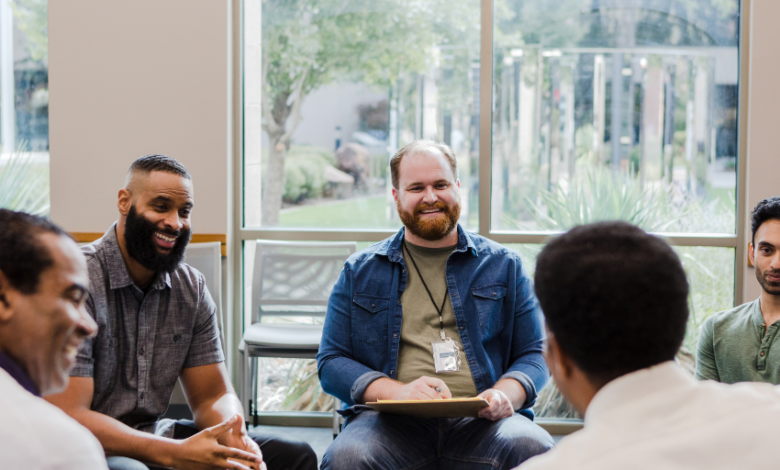Supporting men’s mental health in aerospace

On this International Men’s Day, the Royal Aeronautical Society (RAeS) wants to raise awareness of the achievements and contributions of men in the aerospace, aviation and space sectors. It’s an opportunity to reflect on the importance of mental health and well-being, particularly in industries where the pressures of the job often take precedence over personal health. The day focuses on celebrating the positive impact men have on society, while also addressing challenges such as higher suicide rates, workplace fatalities, and specific health concerns. By promoting better mental and physical health, breaking the stigma around mental health, and encouraging men to seek help when needed, the Royal Aeronautical Society aims to foster a positive male identity and support gender equity across the industry.
History
International Men’s Day (IMD), celebrated on 19 November, was founded in 1999 by Dr. Jerome Teelucksingh, a history lecturer at the University of the West Indies in Trinidad and Tobago. Calls for an IMD date back to the 1960s, when the New York Times reported that many men were advocating for a day similar to International Women’s Day, which had been celebrated since 1909. Over the years, the idea gained traction with statements like “Men’s contributions and concerns deserve a day of recognition in their own right.”
In the 1990s, small events were held in countries like the US, Europe, and Australia, but these lacked the publicity needed to continue. The Maltese Association for Men’s Rights continued to observe the event in February until 2009, when they shifted the celebration to 19 November at the request of Australian IMD organisers. These organisers helped establish the current IMD website and expanded the observance globally. Australia played a key role in making 19 November the official date for IMD, with significant celebrations in both state and federal parliaments, notably in 2008 and 2013.
The mental health challenges facing men in aerospace
In aerospace, where safety, precision, and responsibility are paramount, mental health plays a crucial role in ensuring both individual well-being and team safety. Despite growing awareness around mental health, many men in the aerospace sector face unique challenges in acknowledging and addressing their needs. The industry is known for its demanding, high-performance environments, where the mental load can be substantial. Whether you’re a pilot or aerospace engineer, the pressures of long hours, irregular schedules, high-pressure deadlines, and the constant responsibility for safety can contribute to stress, burnout, and mental health challenges. For men, particularly in traditionally male-dominated fields like aerospace, there is often added pressure to conform to societal expectations of “toughness” and “resilience.” These stereotypes can discourage men from discussing their struggles or seeking help, making it harder for them to access the mental health support they need.
Why mental health matters in aerospace
Mental health challenges can have serious consequences in high-stakes industries like aerospace. Poor mental health can lead to decreased productivity, poor decision-making, and a higher risk of accidents or errors. As we know, the safety of aircraft, passengers, and crew members depends on individuals being at their mental and emotional best.
This is why addressing mental health should be seen as a key priority for the aerospace industry, just as much as any technical or operational concern. Men in aerospace like all employees deserve to have access to support services, resources, and an environment where their mental well-being is taken seriously.
Breaking the stigma: How the aerospace sector can support men’s mental health
The Royal Aeronautical Society is committed to fostering a supportive and inclusive environment for all aerospace professionals. As we mark International Men’s Day, it’s essential that we not only acknowledge the unique challenges men face in our industry but also take action to support their mental health and well-being. Here are some practical steps that can help create a healthier, more supportive aerospace community:
1. Create a culture of openness
One of the biggest barriers to mental health support is stigma, especially the stereotype that men must be stoic and unaffected by stress or emotional challenges. By fostering a workplace culture that encourages open dialogue about mental health, we can break down these barriers. Leaders, colleagues, and peers should feel comfortable discussing their experiences and offering support without fear of judgment.
2. Provide access to mental health resources
Offering employees access to professional mental health services, whether through Employee Assistance Programs, confidential counselling, or online mental health resources, is critical. Ensuring that mental health support is accessible and destigmatised encourages individuals to seek help when they need it.
3. Implement well-being programs
Aerospace professionals should be provided with resources for stress management, mindfulness, and work-life balance. Well-being programs that focus on mental health, physical fitness, and resilience can help individuals manage the unique stresses of the industry. Promoting regular breaks, offering flexible schedules where possible, and encouraging physical activities can all contribute to improved mental health.
4. Prioritise mental health in training and development
The aerospace industry already invests heavily in technical training, but it is just as important to train individuals to recognise and respond to mental health challenges. By incorporating mental health awareness into professional development, organisations can equip staff with the tools to manage their own well-being and support colleagues who may be struggling.
5. Lead by example
Leadership plays a crucial role in shaping workplace culture. Aerospace leaders and senior professionals can set the tone by openly discussing their own mental health, advocating for support services, and encouraging their teams to prioritise mental well-being. When leaders model vulnerability and self-care, it sends a powerful message that mental health is a priority for everyone.
RAeS conference on pilot mental health
Insights from RAeS conference on pilot mental health (27-28 April 2021)
A recent RAeS conference looked at the issue of pilot mental health, what airlines were doing to implement new EASA/CAA regulations, and how the lessons learned could be applied to the wider aerospace community. The 2021 conference, focused on the mental health and well-being of aviation personnel, especially pilots. Key points discussed at the conference included:
1. Pilot stress factors
The job of a pilot is inherently stressful, with long hours, irregular schedules, and the high stakes of ensuring safety. Issues such as crew scheduling and fatigue risks con-tribute significantly to pilot stress. Airlines must balance productivity, quality of life for staff, and fatigue management, often making it difficult to fully address these challenges.
2. Covid-19’s impact
The Covid-19 pandemic added new mental health challenges, from job insecurity to health concerns. Pilots experienced stress from the fear of infection, job losses, and the disruption of flight schedules. However, some pilots reported benefits such as im-proved sleep patterns during lockdowns. The conference noted concerns about “rust-out” as pilots return to work after a long hiatus.
3. Psychological evaluations
New regulations require psychological evaluations for pilots. While these evaluations are intended to ensure pilots’ mental health is being monitored, some pilots fear these assessments may be used against them in a safety context, preventing them from dis-closing mental health struggles. The importance of creating a supportive and confiden-tial environment was stressed.
4. Peer support programs
The value of peer support programs for pilots was discussed, emphasising the need for such initiatives to reduce absenteeism and improve mental well-being. However, for these programs to be effective, both management and pilots need to be convinced of their value, and they must be carefully designed to avoid potential misuse or stigma.
5. Organisational culture
Building a supportive and open organisational culture is key. Trust between employers and employees is vital for ensuring that mental health services are effective. As dis-cussed at the conference, moving from a safety culture to a broader health and safety culture that includes mental health is essential.
RAeS Aerospace Medicine Group Annual Symposium 2024
The RAeS Aerospace Medicine Group Annual Symposium took place on 18 November 2024 at the Royal Aeronautical Society HQ in London, gathering experts to discuss the latest in aerospace medicine. The event covered a range of key topics, including neurol-ogy and ophthalmology updates, CAA Space Regulation, and spacesuit physiology, re-flecting the growing demands of space exploration.
A major focus was on aircrew and aeromedical mental health, aligning with ongoing ef-forts to improve the well-being of aviation professionals. The symposium also featured the Next-Generation Aerospace Medicine student prize presentations, showcasing fresh perspectives on industry challenges.
The event provided valuable updates, fostered collaboration, and reinforced the need for continued advancements in medical practices to support the evolving needs of aerospace and space exploration.
The way forward
As we observe International Men’s Day, it’s an opportunity for the aerospace sector to recommit to supporting the mental health of all employees, men and women alike. By creating an environment where mental health is taken seriously, where resources are readily available, and where seeking help is seen as a strength, we can ensure that the people in our industry are both physically and mentally equipped to excel.
At the Royal Aeronautical Society, we believe that mental health is a critical component of overall professional success. Let’s continue working together to remove the stigma around mental health, ensure access to the support that is needed, and create an environment where everyone regardless of gender can thrive.
Want to learn more about International Men’s Day and its significance? Check out this insightful article that dive deeper into men’s mental health challenges:
Source link



